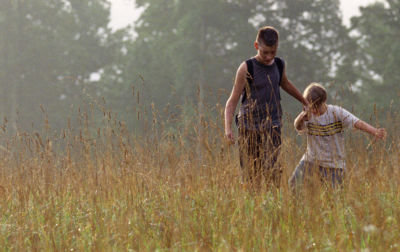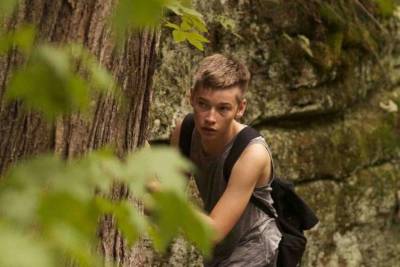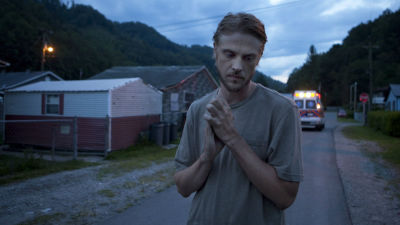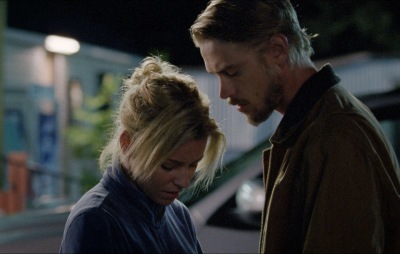Although in limited release, an indie gem that requires mention, and your attention, is Film Independent Spirit Award nominee LITTLE ACCIDENTS. Written and directed by Sara Colangelo, LITTLE ACCIDENTS is a very profound and thought-provoking character study, as well as study of the human condition, focused within the microcosm of reality in a West Virginia coal mining town. If LITTLE ACCIDENTS doesn’t show the true chain of life and how everything intersects with everything else, how one ripple in a pond can change the entire flow of a river, then nothing will. Set against this grander ideal of “life”, however, is the introspective questioning of oneself, of the very moral fabric of a person and how that fabric is tested and trialed both by community/friends/family and by one’s own conscience. The railing against the truth, the creation of facade as a means to hide from one’s own possible failings, is beautifully told – particularly through the characters of Owen, Amos and Diana.
Amos is the sole survivor of a mining accident, struggling to recover physically and psychologically while trying to make his own way back to “society” under the guilt of survivorship. Compounding his personal struggles is the pressure from by the coal mining community when it comes to the government investigations into the accident as well as the class action litigation; they want Amos to look out for them whether the fault of the accident was due to the company or miner errors.
Diana is the wife of mining executive Bill. A woman more worried about social functions and shopping than the deaths of miners in the community who were under the charge of her husband, she has the airs of a seemingly oblivious socialite. But her life is about to change when her teenaged son goes missing.
And then there’s Owen, a young boy whose father was a victim of the mining accident. Always the boy from the “wrong side of the tracks” just looking for acceptance from his peers, after an accident in the woods, he now has his own cross to bear. A devoted older brother to James who has Downs’ Syndrome, the love between the brothers is put to the test thanks to that accident and the guilt Owen now carries.
As LITTLE ACCIDENTS unfolds, the lives of each of these three individuals intersect, connect and showcase the cause and effect of each “little accident” within one’s life.
This is without a doubt the best performance of Elizabeth Banks’ career. A powerhouse of emotion that found that sweet spot between frailty and strength, as Diana, Banks is a powerhouse of emotion and metamorphosis. Banks brings a gravitas to the performances that is riveting, courageous and sad and just knocks it out of the park.
Jacob Lofland, who stole our hearts in “Mud” alongside Ty Sheridan and Matthew McConaughey, does so again here as Owen. It is Owen’s beating heart that is the pulse of the film and a key spoke in the wheel of storytelling. Owen is the future, but can he break free of the past and the sins of the closed community, or will he fall victim as the next generation to run from and hide the truth. Your heart bleeds for Owen as you watch Jacob’s performance. His chemistry with Banks is heartwrenchingly beautiful. But a real testament to Lofland are the quiet moments, the intense close-ups, the pensive, reflective moments – as a boy who, once again, is sparse on words – Lofland soars as he lets his eyes tell Owen’s story, hide his shame and fear. The nuance that he brings physically with his shoulders, the way he hangs his head or the way he treats a bicycle just draw one ever deeper into Owen’s soul. Lofland makes Owen’s hidden pain palpable. And then you put him together with the beyond adorable Beau Wright as little brother James; tissues people, tissues.
Not to be overlooked is Beau Wright. A young man who himself has Down’s Syndrome, as James, Wright delivers a performance that is touching and sweet, bringing a purity of heart and innocence to the role that tugs at the heartstrings. With a resonant idolization for his big brother, the chemistry between Wright and Lofland is a powerful emotional connective tissue.
As he did with bringing authenticity and depth to “Out of the Furnace”, another coal country/mining based film, so Boyd Holbrook does here. Like his young co-star Lofland, Holbrook makes Amos short of words, but always observational, like a sponge; thinking, internally debating, feeling the pressure of what his actions or inactions will do. “Gifted” doesn’t sufficiently describe Holbrook’s performance enough. As with the entire film, a performance that is a study of a man’s character, of the human condition and Holbrook brings that internal debate to life.
And then there’s Josh Lucas. We’re not used to seeing Lucas as a two-faced creep, but as Bill, he pulls it off. Credit goes to writer/director Colangelo who creates an ambiguous moral compass for Bill complete with his self-inflated rationalizations and blame placing that Lucas then embraces.
Put Banks, Lofland and Holbrook together and the dynamic singes the soul. And I’m not talking about them on screen in the same scene together; this is the story construct and the character development and the way the actions of these three characters determine the storyline and the film as a whole. Colangelo has done an incredible job with just the story structure and the “cause and effect” design, not to mention her casting and her lensing.
Then there’s the lensing. Shooting on various locations in West Virginia, including a fully operational family-owned coal mine and mining company, cinematographer Rachel Morrison delivers breathtaking imagery that captures the peaceful calm and heritage of coal mining West Virginia. Known for a diversity to her work as a whole (she is the cinematographer behind “Fruitvale Station” and “Tim and Eric’s Billion Dollar Movie”), her visual storytelling voice has become distinctive and defining as an emotional, quiet, cinematographer. As she did with “Fruitvale Station”, Morrison allows the lens to almost float, settling into an emotional focus; omnipresent but invisible, thus providing an intensity of emotion through the actors and the performance as opposed to unnatural trickery or forced establishing shots. Here, the lensing is crisp and clean, with light and color celebratory of mother nature and her truth and beauty while balancing that with the inky darkness of two backlit figures going into a mine – stunning metaphor for the internal darkness and unknown both Owen and Amos are facing. And yet, with just the headlamps in that brief mine scene, her lens captures the glistening rock on the walls, as if enticing men to dig deeper not only for coal, but within themselves. Powerful execution. Great use is made of looking and lensing through windows throughout the film – everyone is filtering something, hiding something. LITTLE ACCIDENTS screams metaphor on so many levels, with each of more enticing and eye-opening as the last.
LITTLE ACCIDENTS is no little accident. This is a powerful film by design.
Written and Directed by Sara Colangelo
Cast: Elizabeth Banks, Boyd Holbrook, Josh Lucas, Jacob Lofland, Beau Wright

















